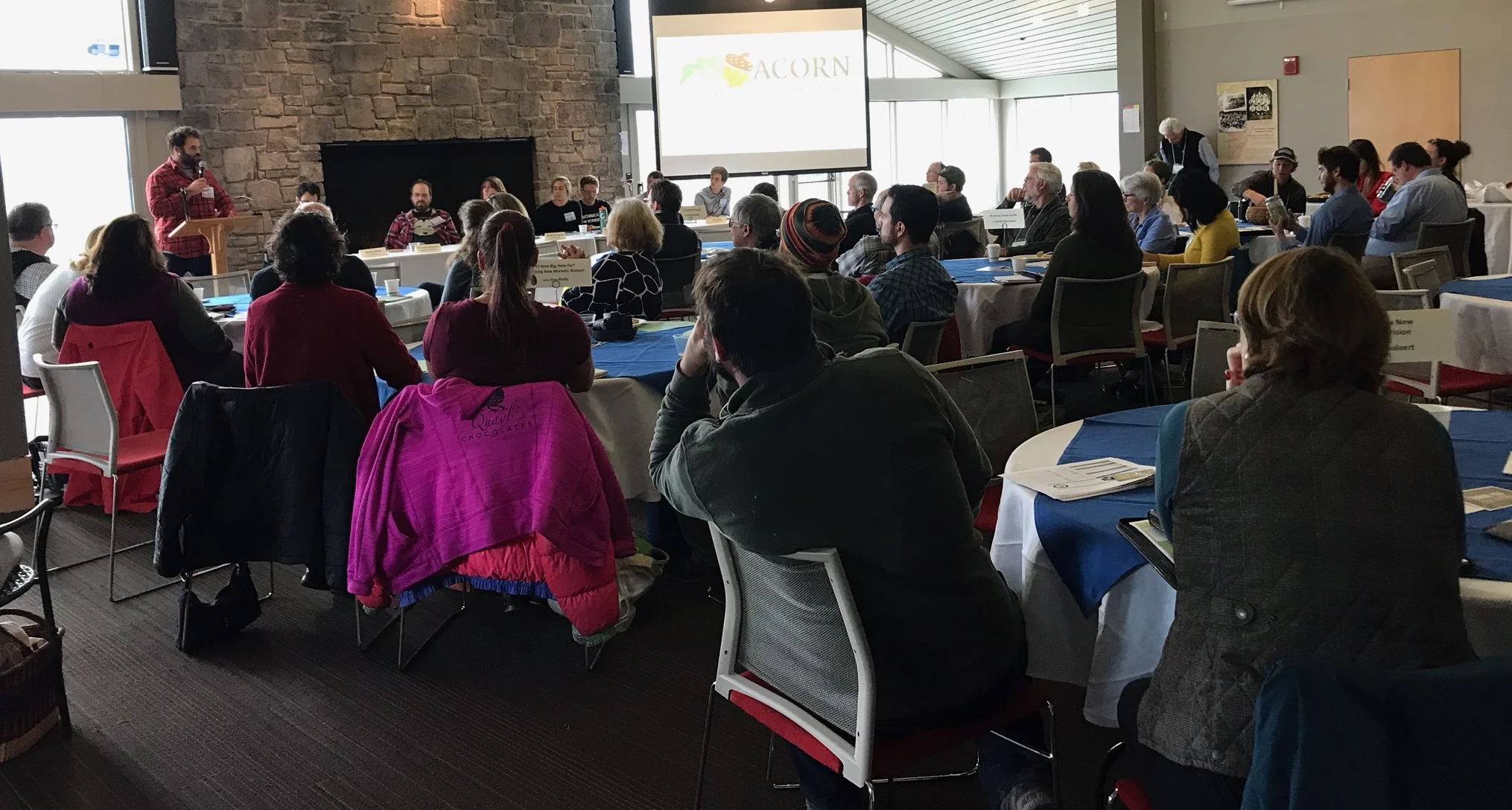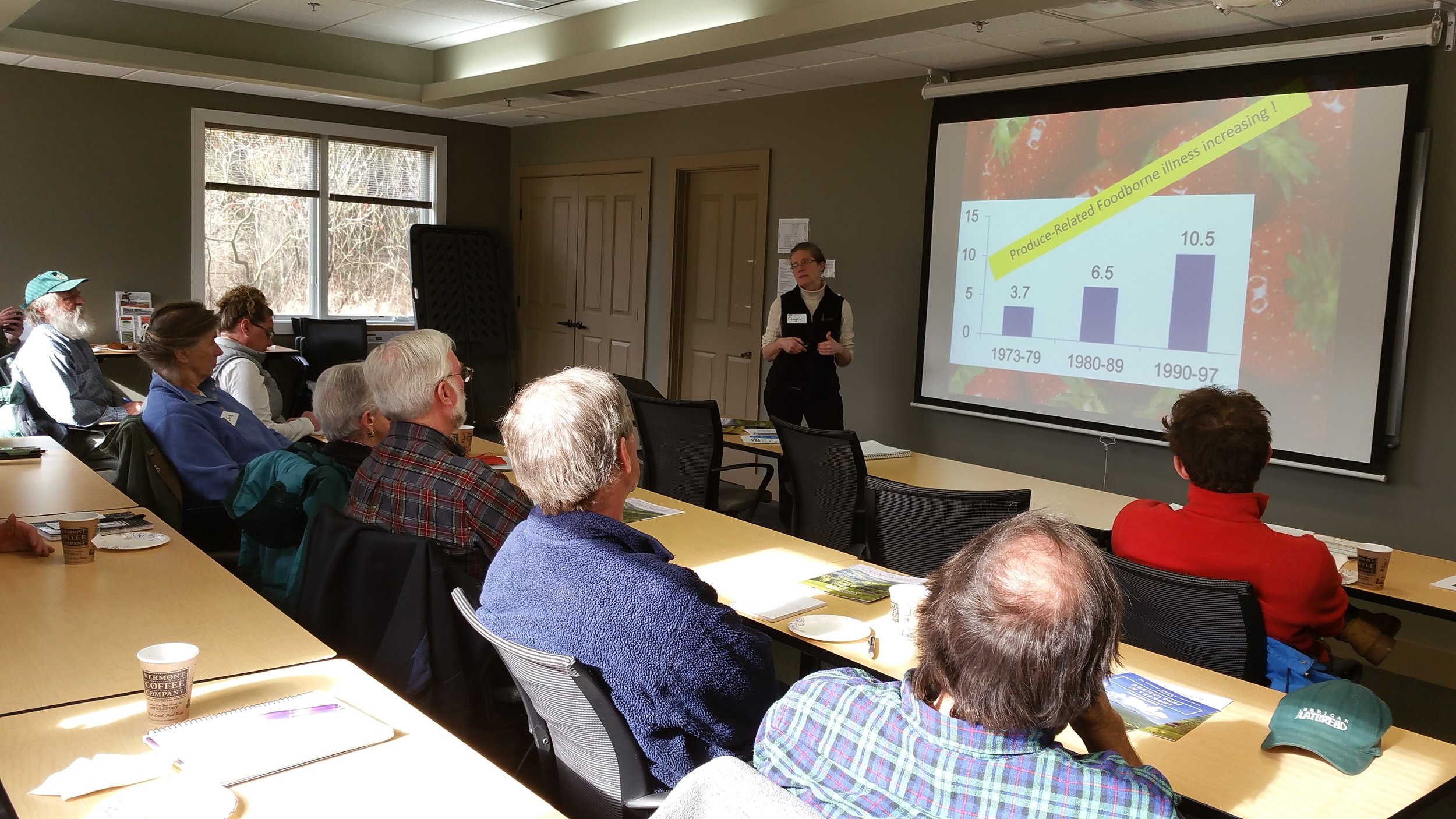We want your feedback!
Farmer and Food Producer Socials
Who: Farmers and food producers join us for an informal conversation and light food and drinks!
Why: ACORN has recently launched an online market that aggregates orders for wholesale buyers. As we work through this process, a number of questions and opportunities have arisen regarding coordinated distribution, cooperatively aggregating products, and the creation of a centralized physical aggregation space.
What: We are organizing a series of farmer socials to:
Debrief how COVID has and continues to affect both your direct sales and wholesale markets
Brainstorm on coordination and cooperation opportunities- how can we organize as growers to more effectively close the gaps in available products and anticipate new wholesale sales?
Learn what others are growing/producing now and share long-term farm goals
Discuss cooperation to scale up and coordinate distribution to make wholesale easier
Work together to ensure long term consistency of products to meet bigger markets
We’ve met at Singing Cedars Farm, American Flatbread, the CVOEO Warehouse, at a board member’s farm and at Little Seed Cafe.
Please join our newsletter to learn about the next meet up!
ACORN’s 2020 Annual Workshop Series
March 11: Cost of Production for Farmers & Food Manufacturers
Understanding your costs of production guides you to profitability and more informed decision making. Calley Hastings of Fat Toad Farm will share her personal insights growing her farm-based business. In this small group workshop, participants will go through the steps of analyzing costs and calculating what it costs to produce a unit of product.
When: 8:30 AM to 12:00 PM
Where: UVM Extension Office - Middlebury, 23 Pond Lane (corner of Mainelli Rd and Exchange Street), Middlebury
Cost: $15 includes light snacks and coffee
CANCELLED: March 12: Hemp Growers Happy Hour
Calling all hemp growers! ACORN wants to hear how your 2019 hemp growing season went. This will be a casual debrief session in a supportive environment. We know 2019 was a huge year; share the good, the bad, and the ugly with other growers. From planting through to processing, let's hear how you did and how you are going to move forward.
When: 5:00 PM to 8:00 PM
Where: Tandem, 26 Main St, Bristol
Cost: $20 includes light fare and a drink ticket
CANCELLED: March 25: Farmer Climate Network Inaugural Meet-Up
ACORN is gauging interest in the creation of a farmer-led network committed to mitigating the effects of climate change on our local foodshed. The Farmer Climate Network will host regular climate-focused farmer events to build a resilient farmer network that is better prepared to mitigate the risks and take advantage of the opportunities that a warming climate will bring.
At this pilot event, Keith Morris of Prospect Rock Permaculture and Willow Crossing Farm will cover regenerative ag techniques farmers are implementing around the Lamoille Valley and Nancy LaRowe of Vital Communities will speak about the Farmer Climate Network in the Upper Valley.
When: Wednesday, March 25, 5:30-7:30PM
Where: Lincoln Peak Vineyard, 142 River Rd, New Haven, VT
Cost: $10 entrance receives a ticket for a glass of Lincoln Peak wine. Light appetizers will be served.
Register: http://events.constantcontact.com/register/event?llr=rm4yijdab&oeidk=a07egxrbwdnaaf2ddfa
CANCELLED: March 28: Spring Homestead Weekend at Wild Roots Farm Vermont
We will have demos and discussions on grafting, pruning, plant propagation, bio-char, soil building and agroforestry systems, as well as a scion swap (so bring some cuttings to share). Bring a dutch oven potluck and wear appropriate footwear for any weather conditions.
Cost: $25 ($5 discount if you attend both days)
When: Saturday, March 28, 9:30AM-3:00PM
Where: Wild Roots Farm Vermont, 195 Harvey Rd, Bristol, VT
Email Jon for more information: wildrootsfarmvt@gmail.com or visit www.wildrootsfarmvermont.com
CANCELLED: March 29: On Farm Slaughter Workshop at Wild Roots Farm
This is an educational workshop on the slaughter and processing of two goats guided by Mary Lake. Mary Lake is a professional itinerant slaughterer, butcher and sheep shearer who lives in Tunbridge.
Mary learned the craft of slaughter through several years of full-time work with the Royal Butcher in Randolph, which is a USDA inspected slaughter facility. Her expertise and engagement through testimony was essential for the new improvements to the On-Farm Slaughter law. At the workshop, Rural Vermont will present the requirements of the updated law and give room for questions and discussion.
Bring a dutch oven potluck.
When: 9:30 AM 12:30 PM
Where: Wild Roots Farm, 195 Harvey Rd Bristol, VT 05443
Ticket Price: $40 for the workshop. $5 discount if you attend both days. ACORN, RV, VGFA, VSGA members get $10 off registration fees. Enter MEMBERPERKS in the discount code during checkout.
Register Here: https://www.ruralvermont.org/events/2020/3/29/on-farm-slaughter-workshop-with-mary-lake
The 4th Annual Producer, Buyer and Distributor Forum Marked Another Successful Year of Connecting Folks Across the Food System
The 4th Annual Producer, Buyer and Distributor Forum took place October 16 at Middlebury College's Kirk Alumni Hall and was a sold out event. This year's theme covered the rewards and risks of growing food businesses and connected buyers, producers across all food categories, distributors and food systems thinkers.
Keynote speaker Dan Horan from New York's Five Acre Farms discussed their Positively Local! campaign and the realistic rises and pitfalls of scaling a local foods business.
Panelists from Skinny Pancake, FinAllie Ferments, Potlicker Kitchen, Sweet Clover Market, Associated Buyers of New Hampshire, Sam Mazza Farm, Pumpkin Village Foods and Venetian Ginger Ale gave perspectives on the challenges and opportunities presented in their specific businesses and sectors. Round table discussions and time for networking over a local foods lunch allowed everyone to connect on deeper levels.
The Forum was sponsored by Vermont Farm to Plate, ACORN and Vermont Agency of Agriculture, Food and Markets and was #RootedinVermont.
Photos from 2019’s Winter Workshops
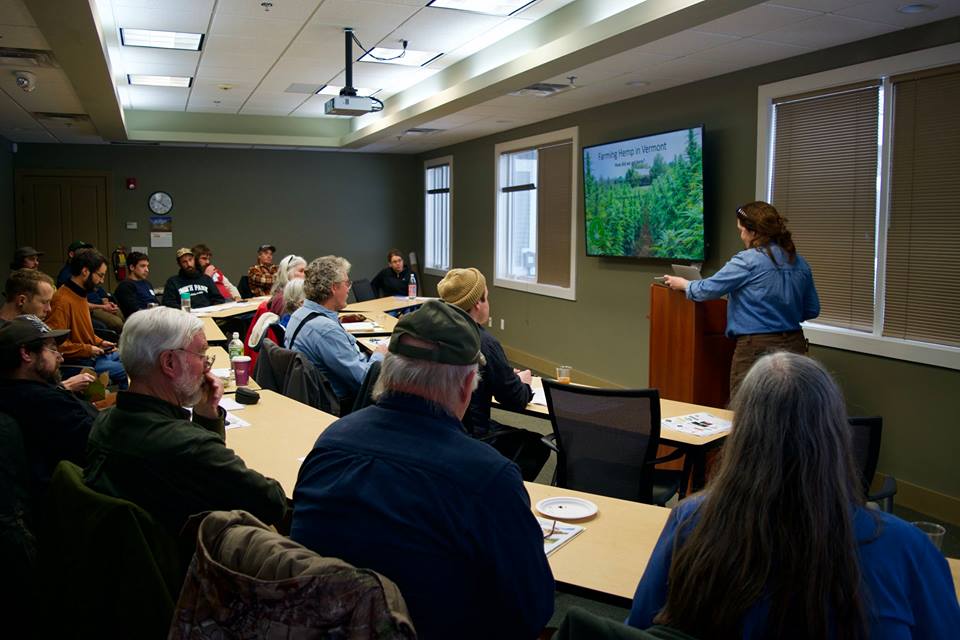
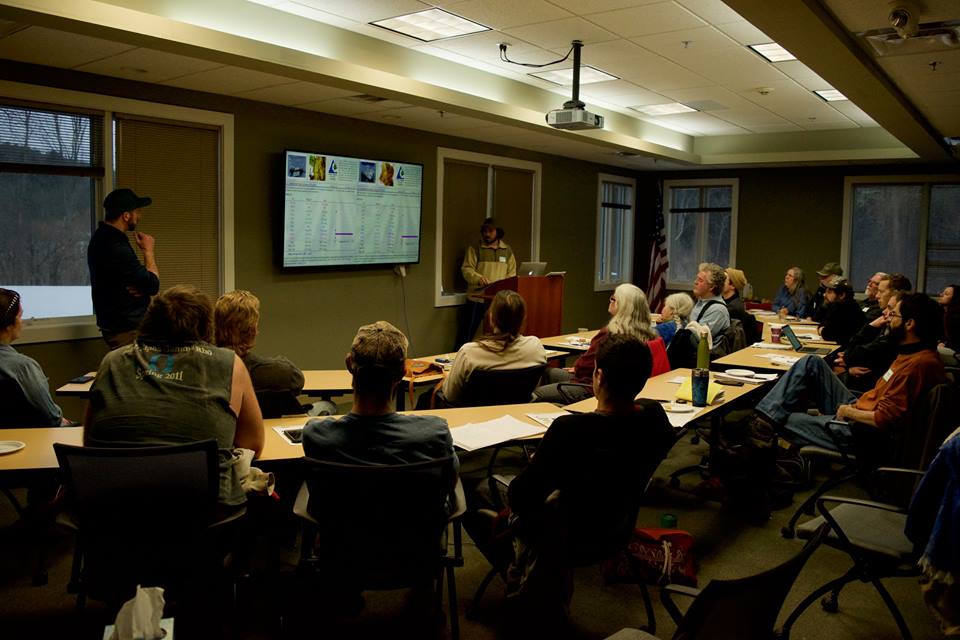
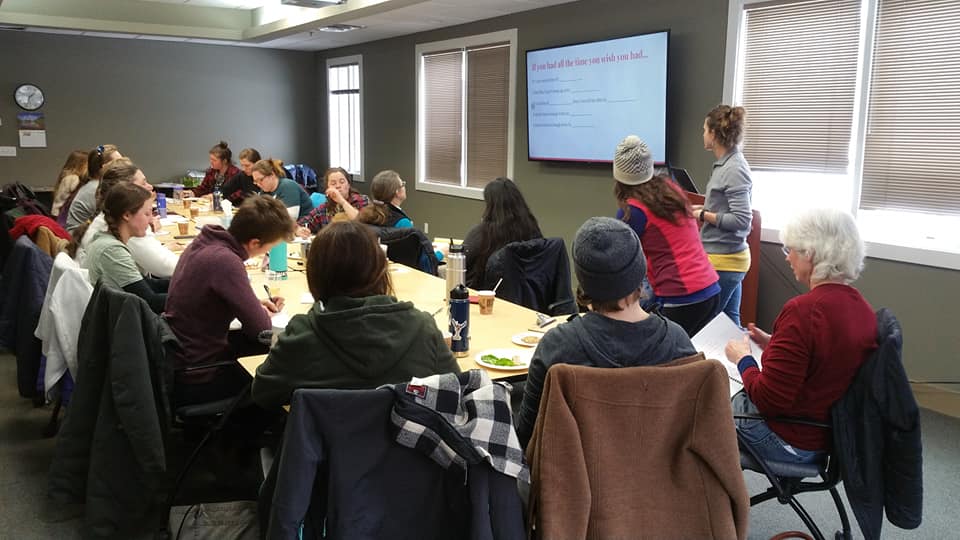
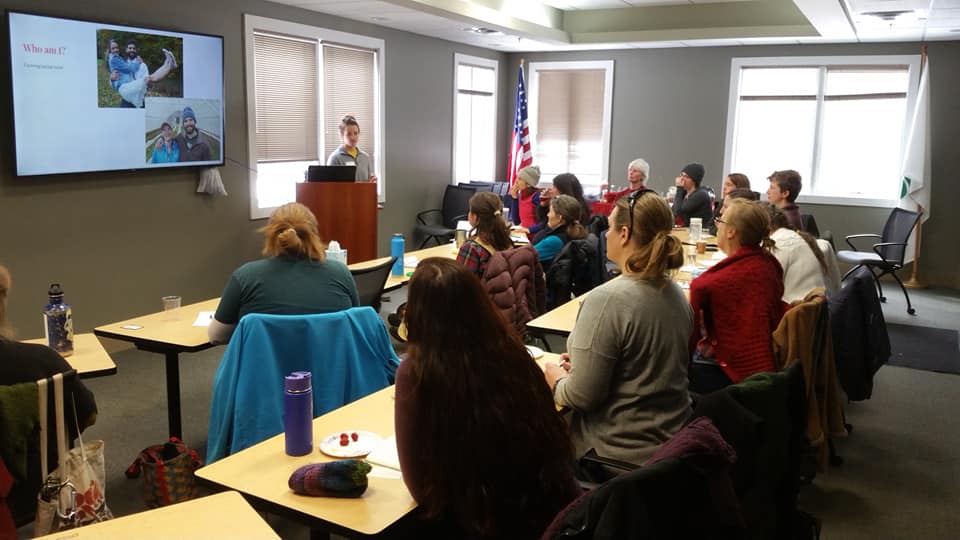
3rd Annual Producer, Buyer and Distributor Forum was Wednesday, November 7, 2018
This event connects buyers, producers across all food categories, distributors and food system thinkers. The 2018 Forum was held Wednesday, November 7 at Kirk Alumni Hall, Middlebury College. This event connected buyers, producers across all food categories, distributors and food system thinkers. There was a panel, a Keynote by April Moulaert of Vermont Tortilla Company and networking and strong alliance building to promote stronger business to business partnerships.
Panelists included Netaka White, hemp consultant, Marikje Shemendine of It's Arthur's Fault! Sauces and Marinades, Rosalie Schleinig of Red Tomato Produce, Thomas Wentworth, Farm to Plate Consultant, Joshua Pfiel of Vermont Pepperworks and Eli Lesser Goldsmith of Healthy Living, among other notable speakers.
We have been receiving fabulous feedback on this unique format which guarantees time to delve into deep conversations and work together to meet Vermont's Farm to Plate goals.
2018 Grower Workshop Series
All Addison County growers were invited to join us for our series of 2018 ACORN sponsored workshops and gatherings.
January 25: Farm to Farmstand Retailing for Farmers with Annie Harlow, VT Farm to Plate Retail Services
4:30-6:30, UVM Extension Office, 23 Pond Lane; corner of Exchange St & Mainelli Roads, Middlebury
Feb 13: How to Work with Distributors to Open Up New Market Opportunities with Vermont Roots & Upper Valley Produce, 9:00am - 12pm noon, UVM Extension Office, 23 Pond Lane; corner of Exchange St & Mainelli Roads, Middlebury
Feb 22 Meeting New Demand for Hemp: A Grower’s Perspective with VT Hemp Company, 5:00-7:00pm Happy Hour, Stonecutter Spirits, 1197 Exchange St, Middlebury
Feb 28 Ag-Tourism: Engaging Visitors with Farm-Based Education Network, Vermont Fresh Network, UVM Extension & local farms, 9:00am - 12:00pm, Goldenwell Farm and Apiaries, 1089 River Rd, New Haven
March 21: Help reclaim the original meaning of organic. An hour and half of information & conversation around soil-based and animal welfare organic standards with David Miskell at Lincoln Peak Vineyard, 5:00-6:30pm, 142 River Road, New Haven
Pre-registration is required, space is limited. Click on the highlighted title of the workshop you'd like to register for to pay via EventBrite. Light snacks will be provided. All payments are a donation to ACORN's mission and tickets are non-refundable.
Grower Meetings in 2016
ACORN Growers meeting, tandem, bristol, january 2016
ACORN hosted a series of grower meetings around Addison County in early 2016. In these intimate meetings, we were able to glean information from growers across food categories and farm sizes.
We learned what obstacles growers were facing, and as well as opportunities for growth and sustainability.
Specifically, growers were interested in:
Networking, collaborating and connecting with other growers regarding:
Grant writing
Delivery
Developing an honor system for produce/ surplus at a destination to replace previous Bristol farmers' market
Bringing food to a NYC or Boston market (and finding a marketer on the other end)
Filling larger institutional buys
Selling humane meat collectively with other producers
Space to make sausage/ process meat
A business model where growers are willing to sell their produce for less if it goes into a food processing kitchen for foodshelves, summer meals, and schools
Increasing sales in Addison County and out of state
Promoting products to city dwellers who don’t grow their own food
An online platform for selling
Opportunities to sell or donate surplus produce, especially when season is erratic: a simplified market for seasonal fluctuations
A solution for food waste (sell to value added producers?)
A method of getting local food to lower-income communities
Bartering
Agritourism
Converting to organic
Growing more in winter and less in summer
An education campaign:
To engage people to buy more local and healthier food
People are cooking less, so we need more education on how to cook with fresh ingredients and DIY
Educating the community about values and priorities (perception that local organic food is too expensive, but $6.50 is spent on a latte)
Pay more for quality food
Eat only what’s in season and available
Obstacles growers identified:
Unpredictable weather
Labor
Specific pests and weeds
Smokehouses' lack of availability and the public's demand of only bacon or other specific cuts of meat
Hard to get slaughtering dates
Farmers markets' failing:
Home growers and CSAs are negatively affecting farmers' markets
Markets are not time efficient with relation to money earned
Markets aren’t financially viable
Actual sales dates are contracting: there are less market dates every year
There is high competition for the same products
Markets are now more about prepared foods
Costs:
Lack of financial capacity in Addison County for locals to buy local food
Organic food costs more in Vermont than other places (Seattle, Montreal)
Vermont rental space is expensive for value added producers
The cost of delivery to Burlington: it takes time and is expensive – should farmers form a collective for delivery? How do they fund this? (Costs $100 per stop for Black River Produce to pick up and deliver)
Farmers haven’t gotten paid by some wholesale buyers in the past
Wholesale prices are too low, and farmers can’t price above Black River, but the costs of production for wholesale are high
It is tough for organic prices to compete with conventional prices
Chittenden County is saturated with non-profits and food companies (ie: Intervale is competition with their huge variety of products)
Regulations for regional markets:
GAP is expensive
Paperwork is prohibitive for a farmer; they would have to hire someone, which would drive up prices and/or put farmer out of business
Challenges in selling to local schools:
They’re not open in the summer so are limited to only purchasing fall produce
Farmers have to deliver produce themselves
Schools' budget is 40% of the Co-op’s wholesale price
Chefs and local retail buyers go through management quickly so farmers are constantly re-introducing themselves to get products in store
Local hunger is an issue, how do we connect farmers with those hungry people? There’s a missing link for those who are hungry
How do farms get funding like the food shelf's funding?
The food shelf has too much food and won’t accept more
Farmers want to sell more to local people, in the community, and not to the wealthier people out of the community, but can’t afford to do that due to the costs of production, regulation and delivery
1st Annual ACORN Producer and Buyer Forum in 2016
ACORN Producer and buyer forum, march 2016
ACORN hosted the aforementioned series of grower meetings in early 2016 to assess the needs and desires for future workshops and gatherings. These meetings resulted in the first annual ACORN Producer and Buyer Forum at Middlebury College in March 2016. This successful event had over 80 attendees and connected regional and local buyers with farmers and food producers who were looking to scale up and expand sales.
Two panels of buyers spoke from various perspectives: institutions, non-profits, food hubs and retail operations. There was also a "cocktail party" period of time for networking where buyers and farmers were able to connect on a personal level, resulting in new local and regional sourcing contracts!
Charlie mitchell, cao of middlebury foods, discusses sourcing from local, regional and statewide markets
ACORN plans to organize more grower workshops and host the Forum event annually, with a dynamic theme based on growers' current needs and industry trends.
Grower Workshops
fsma, raps and gaps workshop, uvm extension, middlebury, march 2016
ACORN also hosts regional workshops based on grower-requested topics, such as:
Food Regulation (FSMA, GAPs and RAPs)
Marketing & Social Media
Business Efficiencies and Infrastructure Audits
Nutrient Management/ Soil Fertility
Labeling
Understanding Costs of Production
If you'd like to request or host a workshop with ACORN, please contact us at info@acornvt.org.
Feedback from attendees
“Today was a great event - chapeau!! Really well organized, informative, and inspiring. ”
“Thanks for all your good work!”
“Thank you! Great having ACORN as a catalyst in the community. ”
“Great workshop, thanks! ”
“Thank you for the meeting. I enjoy the diversity of the people/producers, the energy of the people. ”
“Glad you are holding these get- togethers. It’s great to get out and exchange ideas, find out what other people are thinking, etc. ”
“Thank you for a great overview of markets in the area. ”

